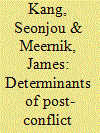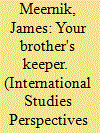| Srl | Item |
| 1 |
ID:
051634


|
|
|
| 2 |
ID:
065289


|
|
|
| 3 |
ID:
113822


|
|
|
|
|
| Publication |
2012.
|
| Summary/Abstract |
Given the myriad of human rights abuses that occur globally and daily, why are some nations on the receiving end of a substantial amount of international opprobrium, while others receive far less attention and condemnation? The authors contend that the increasing presence of human rights organizations in such states is the critical link between the local and the international. Increases in the number of such groups contributes significantly to the generation of Amnesty International urgent actions, one of the most-often-utilized tools in naming and shaming campaigns against human rights abusing regimes. The authors find strong support for nearly all their hypotheses.
|
|
|
|
|
|
|
|
|
|
|
|
|
|
|
|
| 4 |
ID:
144458


|
|
|
|
|
| Summary/Abstract |
Research on human rights treaties has mostly reached depressingly similar conclusions – that such treaties and their resulting institutions have little or no impact on human rights. The International Criminal Court, however, possesses significant power to investigate and prosecute violations of international law that equip it with potentially more influence than previous human rights regimes. I suggest, however, that the impact of the ICC on human rights is conditioned by signatory governments’ commitment to good governance and acceptance of the role of the ICC in addressing violations of international law. I develop a two-stage model of ICC ratification and human rights abuse that shows that while many states have ratified the ICC Treaty, not all are committed to stopping the crimes under its jurisdiction. Rather, state commitment to human rights depends first on its commitment to the rule of law within its own borders. Second, commitment to human rights depends on states’ willingness to grant the ICC the powers necessary to carry out its mission. Through a number of statistical tests, I find strong support for these hypotheses on states’ human rights and propensity for violence.
|
|
|
|
|
|
|
|
|
|
|
|
|
|
|
|
| 5 |
ID:
081993


|
|
|
|
|
| Publication |
2008.
|
| Summary/Abstract |
Suspected war criminals who remain at large can do great damage to post-conflict, peace-building efforts. I develop a model of war criminal apprehension predicated on the behavior of international actors to alter the cost/benefit calculus of suspected war criminals and their supporters and make them either more susceptible to capture or make them more likely to surrender. I test this model with duration analysis using data from the International Criminal Tribunal for the Former Yugoslavia regarding the indictment and capture/surrender (if achieved) of over 100 individuals wanted for war crimes, crimes against humanity and genocide. The results demonstrate that not only is it possible to model these phenomena, but that there are a variety of actions the international community can take to facilitate the capture and surrender of suspected war criminals.
|
|
|
|
|
|
|
|
|
|
|
|
|
|
|
|
| 6 |
ID:
061557


|
|
|
| 7 |
ID:
190906


|
|
|
|
|
| Summary/Abstract |
This paper develops an account of the relationship between language endangerment and conflict violence by combining insights from the fields of political science and linguistics. We develop a theoretical account of the manner in which the violence and disruption of community life jeopardizes the viability of communities that speak endangered languages. Our goals for this paper are to synthesize the contributions linguists and political scientists have made to the study of language endangerment and political violence; develop a theoretical account of language endangerment; and utilize statistical analysis to correlate factors related to political conflict and violence with language endangered communities. We test our theoretical model on language endangerment across the municipalities of Colombia and find support for our hypotheses.
|
|
|
|
|
|
|
|
|
|
|
|
|
|
|
|
| 8 |
ID:
082626


|
|
|
|
|
| Publication |
2008.
|
| Summary/Abstract |
We develop a theory of foreign policy voting in the Senate premised on the assumption that foreign policy programs are a mostly collective good whose costs and benefits accrue to all, but which generate insufficient political benefits to make such policies politically popular, and often make it difficult for senators to support presidents. While certainly at times in U.S. history, presidents have enjoyed remarkable levels of such support (e.g., during the early years of the Cold War), more often than not, politics do not stop at the water's edge. Why should this be so? We seek to provide scholars a more comprehensive understanding regarding the underlying proclivity of legislators to support the President given the public goods costs of foreign and defense policy and based upon the issue at stake, the political environment and common partisan and ideological preferences. After elaborating upon this account of foreign policy voting, we test our hypotheses by examining the voting behavior of individual senators on all foreign policy related roll call votes in the U.S. Senate from 1979-2000 on which the President clearly expressed a preference, and find strong support for our expectations
|
|
|
|
|
|
|
|
|
|
|
|
|
|
|
|
| 9 |
ID:
057591


|
|
|
| 10 |
ID:
172331


|
|
|
|
|
| Summary/Abstract |
It is a central assumption of our research that threats to a fragile security and violence can continue during postconflict peacebuilding and that these threats are driven by many of the same sociopolitical dynamics that initially led to war. We examine a critical but much less queried area of postwar societal instability—violence directed at segments of the population who may still be targets for those seeking dominance. Using a survey of 300 individuals who testified before the International Criminal Tribunal for the Former Yugoslavia (ICTY), we seek to explain violence, threats of violence, and other forms of intimidation directed at those who witnessed human rights violations during the wars in the former Yugoslavia. Our theory of postwar violence emphasizes the vulnerability of the (potential) victims of postwar violence. We argue that victims are selectively chosen because of their vulnerability. We develop and test an alternative explanation for this selective targeting that emphasizes the level of exposure an individual may have because of testifying at the ICTY. The results demonstrate quite convincingly, however, that it is vulnerability rather than exposure risk that predicts who is most likely to be targeted with human security threats.
|
|
|
|
|
|
|
|
|
|
|
|
|
|
|
|
| 11 |
ID:
165254


|
|
|
|
|
| Summary/Abstract |
States have long employed other actors, including other states and nonstate actors, as fighting forces to help them achieve the national security objectives that they are unwilling or incapable of realizing unilaterally. In the international courts in recent years, however, there has been the increasing willingness to hold individuals accountable for violations of international law committed by those forces to whom they are providing assistance. For example, the Special Court for Sierra Leone found President Charles Taylor of Liberia guilty of aiding and abetting forces in Sierra Leone that repeatedly violated international law and inflicted untold human suffering on the people of that country. After delineating the legal risks facing state leaders that provide support to third party actors, I delve into conflict data to determine just how widespread the problem is. I examine the frequency with which actors commit violations of international law, and in particular the targeting of innocent civilians, and the extent to which such forces are being assisted by external actors. I find that this problem is prevalent and that many major powers have provided assistance to allies that violate international law.
|
|
|
|
|
|
|
|
|
|
|
|
|
|
|
|